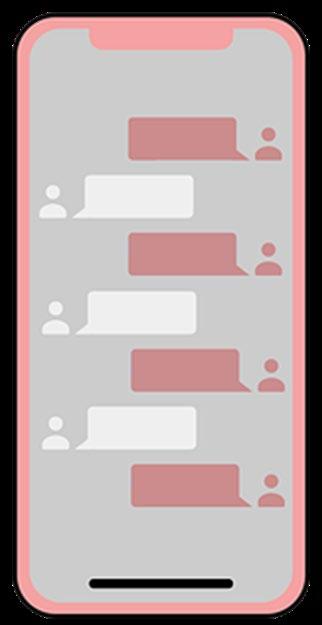






Smartphone Free Childhood is a parent-led movement whose mission is to protect children from the dangers of using smartphones too young.
The premise behind this movement is that all parents/carers of a class all agree not to give their children smartphones (therefore the level of peer pressure is reduced) for a set time or until a specific age. Are you ready to join? Find out more here: https://smartphonefreechildhood.co. uk
You may feel your child does need a phone, particularly if they are walking home by themselves but there are alternatives to the smartphone, including a watch, which are listed here: https://smartphonefreechildhood.co. uk/alternatives
If your child already has a smartphone then Internet Matters have a section on their website with advice on smartphone safety: https://www.internetmatters.org/set upsafe/


There are many positives to being online, but we do need to be aware of the negative aspects including those that may impact our child’s mental health and wellbeing, for example:
• Social media (spending too much time on social media, comparing ourselves to others, filtered images and desire to achieve likes).
• Cyberbullying
• Seeing inappropriate content
• Constantly connected/information overload
• Excessive screentime
• Negative impact on our sleep
Further information

• Childnet discusses digital wellbeing in more detail and includes top tips and conversation starters: https://www.childnet.com/help-andadvice/digital-wellbeing/
• The NSPCC provides further information about mental health including signs to look out for and how to get further support: https://www.nspcc.org.uk/keeping-children-safe/childrens-mentalhealth/depression-anxiety-mental-health/

Whilst WhatsApp has an age rating of 13+ (recently lowered from 16), a BBC investigation has found that children as young as nine have been added to WhatsApp groups and seen inappropriate content. If your child is using WhatsApp, check their group settings as by default, group privacy settings are set to ‘everyone,’ which means anybody can add your child to a group without their approval. You can change this setting to ‘My Contacts’ so only contacts can add them to groups without their approval and if somebody who is not a contact wants to add them to a group then they will need to send them an invite.
You should talk to your child about the risks of joining groups and show them how to use the reporting/blocking tools. You can find out more about the BBC investigation here: https://www.bbc.co.uk/news/articles/cy0l4z8n1p9o
Users of this guide do so at their own discretion. No liability is entered into. Current as of the date released 01.05.24.


Are you worried that your child is addicted to being online/on their device? Recent research from Ofcom reported that “34% of parents of children aged 3-4 said it was hard to control it, rising to half (49%) of parents of children aged 16-17.”* Bark have produced a blog which discusses what addiction is, how to recognise the signs and examples of what digital addiction can look like. You can find the blog here: https://www.bark.us/blog/digital-addictions/
[*source:
https://www.ofcom.org.uk/research-and-data/media-literacyresearch/childrens/children-and-parents-media-use-andattitudes-report-2024 accessed 24.4.24]



There is a lot of information online that is incorrect/fake or misleading and it can sometimes be difficult for adults to distinguish between what is true and what is fake, never mind for younger people. We need to develop digital literacy skills in our children by encouraging them to think critically about what they read online and to fact check. Both the BBC and Channel 4 have fact checking areas on their websites:
• https://www.bbc.co.uk/news/reality_check
• https://www.channel4.com/news/factcheck/
One way to start the conversation would be to play a game such as ‘Can you spot the signs of fake news?’ from the BBC: https://www.bbc.co.uk/bitesize/articles/zwfm8hv
Further information
• https://saferinternet.org.uk/online-issue/misinformation


Internet Matters have published guidance outlining the benefits and risks of online gaming and how you can support your neurodivergent child. You can read the guide here: https://www.flipsnack.com/internetma ttersorg/guidance-for-parents-ofneurodivergent-gamers-internetmatters/full-view.html


New research commissioned by Ofcom reported that “all children who took part in the research came across violent content online, mostly via social media, video-sharing and messaging sites and apps. Many tell us this is before they have reached the minimum age requirement to use these services.”
You can read more about Ofcom’s findings here: https://www.ofcom.org.uk/newscentre/2024/encountering-violentonline-content-starts-at-primary-school


Vodafone have published an article highlighting research which shows that “69% of preadolescent boys have encountered misogynistic content online”. This article discusses how to approach this issue with your child and what to do if they start repeating negative views seen online.
https://www.vodafone.co.uk/newscent re/smart-living/digital-parenting/howto-talk-to-your-teenage-sons-aboutonline-toxicity/
